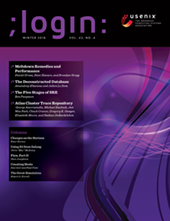
For Good Measure: Nameless Dread
Website Maintenance Alert
Due to scheduled maintenance, the USENIX website may not be available on Monday, March 17, from 10:00 am–6:00 pm Pacific Daylight Time (UTC -7). We apologize for the inconvenience and thank you for your patience.
If you would like to register for NSDI '25, SREcon25 Americas, or PEPR '25, please complete your registration before or after this time period.
;login: Enters a New Phase of Its Evolution
For over 20 years, ;login: has been a print magazine with a digital version; in the two decades previous, it was USENIX’s newsletter, UNIX News. Since its inception 45 years ago, it has served as a medium through which the USENIX community learns about useful tools, research, and events from one another. Beginning in 2021, ;login: will no longer be the formally published print magazine as we’ve known it most recently, but rather reimagined as a digital publication with increased opportunities for interactivity among authors and readers.
Since USENIX became an open access publisher of papers in 2008, ;login: has remained our only content behind a membership paywall. In keeping with our commitment to open access, all ;login: content will be open to everyone when we make this change. However, only USENIX members at the sustainer level or higher, as well as student members, will have exclusive access to the interactivity options. Rik Farrow, the current editor of the magazine, will continue to provide leadership for the overall content offered in ;login:, which will be released via our website on a regular basis throughout the year.
As we plan to launch this new format, we are forming an editorial committee of volunteers from throughout the USENIX community to curate content, meaning that this will be a formally peer-reviewed publication. This new model will increase opportunities for the community to contribute to ;login: and engage with its content. In addition to written articles, we are open to other ideas of what you might want to experience.

What’s in a name? That which we call a rose
By any other word would smell as sweet;
Romeo and Juliet, Act 2, Scene 2
Each generation of global commerce and culture has to decide for itself what the Internet “means” to them. Some of that meaning will depend on how large the Internet is at that time. Delightfully, the unit of measure of that largeness will also change with every era.
There was a time when to be “on the Internet” meant that your host’s name was published in a central registry called HOSTS.TXT—and then the wheels came off. The original text-only terminals were replaced by graphical workstations, later by personal computers, then by virtual servers, followed by smartphones, and, eventually, smart devices. But whereas the timeshared minicomputers that once serviced text-only terminals had names, the workstations and personal computers that came later were given names mostly out of habit: we wanted to know where connections to our time-shared computers and servers were coming from, but we would rarely have any reason to try to connect back to those origins
